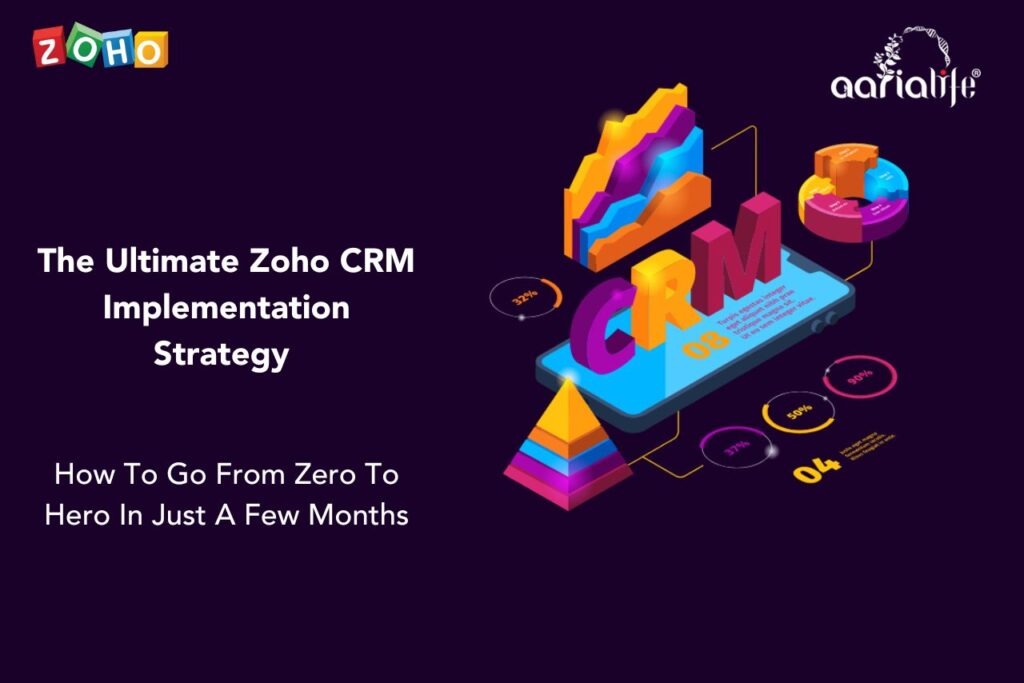Small and medium-sized businesses are defined by the number of employees and annual revenue they generate. The business plan in such firms is mostly growth-oriented, as they are constantly experimenting with new ways to engage with their customers and aligning their sales strategies to achieve the greatest results. Software can make it easier to manage a business, but integrating new software into an ever-changing, developing ecosystem comes with its own set of obstacles.
CRM systems are the latest trend in the corporate world, so no prizes for guessing! Companies understand the benefits of adopting the best CRM system for business requirements.
Every business is willing to invest in a CRM system since it helps them build strong relationships with their customers. Despite having a CRM system in place, businesses struggle to obtain the desired results due to a lack of proper strategy and guidance. It is vital to develop a roadmap for CRM implementation in your organization.
Six crucial implementation phases can be used to summarize a CRM implementation plan.
Related blog-Ten Tips On How To Make Your CRM Implementation A Success
Customer Relationship Management Strategy – Origin
Changes in the buyer-seller arrangement prompted the demand for customer relationship management. Beginning in the 1970s, a transition away from transactional sales and marketing habits and toward a customer-centered pattern began. In the 1980s, relationship marketers enhanced the concept, and in the 1990s, technological advancements sped developments even more. The internet’s evolution, developments in social media technologies, and empowered customer behavior altered the model permanently in the 2000s. As a result, there was a shift in how customers were viewed as the major business asset. The following goals had to be met by the customer relationship management strategy:
1. In addition to providing excellent products and services to existing and potential customers, determine how to gratify them.
2. Optimize efficiencies and reduce acquisition costs by assisting in customer retention.
3. Ensure customer satisfaction, happiness and a positive customer experience.
4. Enhance the entire relationship between the company and its target customer.
During the late 20th and early 21st centuries, economic uncertainty posed a challenge to current sales and marketing strategies aimed at attracting as many new customers and transactions as possible. Maximizing the value of current clients and gaining the financial benefits of this strategy helped to reduce the economic difficulties of those decades.
The Best Zoho CRM Implementation guide that will make you a hero from zero
Company’s growth and development are dependent on the CRM system you use. One should be aware of the most effective tactics for selecting the best CRM system for their business.
Are you planning to adopt a new CRM system in your company? If that’s the case, stay reading to learn about the finest strategies for setting up a CRM system. Even if you have no plans to buy one, this blog may encourage you to do so.
The main techniques to consider when implementing a Zoho CRM system for your organization are listed below.
Know your business objectives—You must be informed of your CRM system’s requirements and expectations. Define why you require a CRM solution for your business. Here are some of the objectives that can help you figure out why you’re here.
- Better customer service
- Better team management
- Detailed analytics and reporting
- To increase productivity and efficiency
- To increase profitability.
If this is one of your criteria, you can go ahead and implement a CRM system for your business. This is possible with a CRM implementation projects plan that significantly raises client retention rates and improves customer engagement.
Assure end users that the new CRM solution will address the business challenges they have been facing.
Related blog- 5 Common CRM Implementation Struggles And How To Overcome Them
6 Tips to Zoho CRM Implementation Strategy
When you’ve completed the full cycle of planning, implementing, and rolling out CRM to your staff, you’ve finished setting up CRM for your firm. Companies spend more money on top-of-the-line CRM systems, but less time and money on deployment. It all starts with the correct implementation approach to minimize failure and ensure a seamless CRM launch. To ensure a successful implementation, we recommend that you follow the recommended practices listed below:
1. Employees benefit from Zoho CRM’s adaptability
Employees are the ultimate users of any CRM system you adopt for your firm. Employees that are resistant to changes, will be one of the most difficult obstacles to overcome during the entire process. It is critical to ensure that your employees are comfortable with the new system. The goal of deployment is to improve user adoption by training users about CRM capability and how to utilize it effectively.
The new Zoho CRM system is user-friendly and simple to use, allowing them to boost their production and efficiency.
Determine who the end users will be and how they will use CRM.
While most people realize how a successful CRM deployment benefits sales and marketing teams, practically every other cost center can benefit as well. Benefits like artificial intelligence for sales, workflow automations, real-time reporting, and more are all included in Zoho CRM.
Sales
Dirty data is a waste of time for your sales team, not to mention a source of confusion.
A CRM system enhances the sales process by offering a centralized resource for sales people to assist customers through the sales cycle, including contact information, purchase history, internal notes, conversation logs, and customer journey tracking across the sales funnel. Your sales pipeline is one of the most crucial aspects of a CRM implementation.
All sales reps with a basic understanding of business can use Zoho CRM software to achieve your business goals successfully.
Marketing
In a multichannel world, marketing professionals utilize CRM tools like marketing automation to develop focused customer lists, track marketing campaigns, and automate communication. Marketers can use CRM data to track information such as customer feedback, campaign effectiveness, and metrics once an activity is finished.
Operations
A tool to enhance business operations and boost efficiency is Zoho CRM.
Customer service and fulfillment teams, in particular, are critical to keeping CRM data relevant and valuable by keeping records up to date with customer interactions, order updates, and other information that adds to the understanding of a customer’s relationship with a company.
Human resources
While the relationship may not appear clear at first, HR managers may utilize Zoho CRM platforms to measure KPIs that can be used to inform employee reviews for tasks like as sales, marketing, customer service, and fulfillment.
Finance
Finance looks into CRM reports and data to see which departments could benefit from cost-cutting. Finance teams can also acquire the real-time data they need for financial planning and strategic decision-making by having fast, direct access to revenue predictions and other financial data.
2. Zoho CRM capability to use Remotely Accessible From Any Part of the World
Implementing a CRM system that can be utilized on all devices, including mobile phones, laptops, tablets, and desktops, is the ideal choice. Choosing a tool like Zoho CRM can be used on a variety of web-enabled devices.
Because most employees are early adopters of technology, you’ll want flexible platforms that is continually updated and up to date.
3. Zoho CRM System Easily Scalable.
You want your company to grow, and so should the CRM system you’re putting in place. Zoho CRM gives a platform that can handle your workflows. Similarly, you want a CRM that will grow with your business and adapt to new operations without requiring any modifications.
The most significant feature is that Zoho CRM does not obstruct the adoption of the specific business processes that your organization requires today and in the future.
4. Compatibility of Zoho CRM with Existing Systems
Make sure a new CRM system is compatible with your old software before deploying it. If you need help integrating all of your systems via APIs, look for a third-party platform that can combine your systems to maximize your data organization.
One of the CRMs that is capable of and compatible with existing systems is Zoho CRM.
Unlike some business software, CRM implementation typically doesn’t happen overnight.
5. Making reports might be tedious, so delegate the task to your Zoho CRM.
Reporting and analytics can assist you gain insight into business metrics, company’s and customers’ behavior to fuel better business decisions. Report on key metrics and stay up-to-date on your team’s progress using dashboards, roll-up reports, and automated workflows that keep your team connected and informed.
You can utilize this to increase the quality of your product or service by tailoring it to your clients’ wants. Personalize reports based on your data to emphasize your wins, losses, and areas for improvement.
6. Zoho Mobile CRM is a must-have.
What if one or more of your sales reps is on the road or on a business trip? Is this to say they won’t be able to operate as usual? No firm can afford such a crisis, which is why mobile CRM is so important. Providing your sales force with a mobile CRM not only provides flexibility, but it is also a proven strategy to boost sales.
As a result, go with a platform like Zoho CRM that has a powerful mobile CRM.
Bottom Line
After you’ve chosen the correct CRM software, the implementation process must be carefully planned. The implementation team is responsible for ensuring that your business achieves the goals it set when choosing a CRM system. The key to a successful CRM implementation is planning.
A clear CRM strategy is the first step toward a successful CRM implementation. A CRM that is customized to your specific needs and operations can help you focus all of your efforts on your customers. There is always a risk when adopting new technology, but we are in the midst of a technological revolution, and you cannot afford to ignore these advancements.
Business owners frequently believe that the CRM is being used to its full potential when in fact there are still some areas that require professional assistance to work.
Aarialife is a Zoho CRM Premium Partner headquartered in Pune, India. We have offered Zoho services to our clients globally and helped them with CRM Implementation, Integration, Customization, Support and Training. Our business consulting service ensures that you are properly educated about the benefits of using a specific procedure, as well as recommending processes that will help you expand your company even more. We have a business-led approach, which means that your company’s success is always our top concern.
To learn more about Zoho CRM, contact us.



